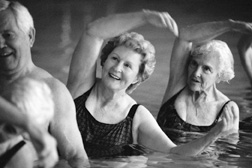|
|
With Sporadic Exercise, Seniors Live Longer
By Charnicia E. Huggins, Reuters
Sweden
July 19, 2004

Staying physically active during the golden years may help seniors live longer, according to a team of Swedish researchers.
They found that men and women aged 65 years and older who engaged in even occasional physical activity during their leisure time were much less likely to die during a 12-year period than their sedentary peers.
In light of this finding, "preventive resources among the elderly should include moderate exercise such as walking," Dr. Kristina Sundquist of the Karolinska Institute in Stockholm, and her colleagues write in the American Journal of Preventive Medicine.
In the current report, Sundquist and her team investigated the association between varying levels of physical activity and death from any cause among 3,206 elderly study participants.
Overall, 925 women and 881 men died during the 12-year follow-up period, the researchers report. Death rates were highest among smokers, those with lower levels of education, those who reported engaging in little to no physical activity and those who said they had poor health as well as among the underweight, obese and those with diabetes and high blood pressure.
Seniors who said they sometimes took hour-long walks, went skiing, picked mushrooms or otherwise participated in occasional physical activity were 28 percent less likely to die from any cause than those who admitted getting "practically no exercise at all."
Further, those who were more active -- who reported going on fast walks, jogging or cycling about once a week -- were 40 percent less likely to die.
These findings remained true even when the researchers took into consideration the seniors' smoking status, weight and height, self-rated health and other factors that may have contributed to increased longevity, the report indicates.
The exact reason for the reduced death risk among the active elders is unknown, but Sundquist and her team suspect that it may be due to their lower risk of dying from cardiovascular disease, one of the most common causes of death in Western countries. In fact, findings from a review of several studies involving older adults point to the cardio-protective effects of physical activity among older men.
"Physical activity has a lowering effect on blood pressure and lipid levels and reduces the risk of diabetes, which in turn has a protective effect on the heart and the blood vessels," Sundquist told Reuters Health.
Yet seniors who were physically active twice a week or more frequently did not have an even further reduced risk of dying than those who exercised just once a week, and the researchers do not know why.
"We cannot explain why those who exercised more frequently did not have an even further reduced risk of death," Sundquist said. "Perhaps the cut point for physical activity in order to achieve a reduced risk of death is lower for elderly than for middle-aged people."
In light of the findings, Sundquist and her team advise seniors to get moving.
"We recommend fast walks, skiing, swimming, jogging, cycling at least once a week," she said.
If once a week is too grueling, however, older adults should at least try to engage in physical activity every once in a while. "Our results showed that even occasional physical activity significantly reduces mortality, however to a lesser extent than once a week," Sundquist said.
|
|



